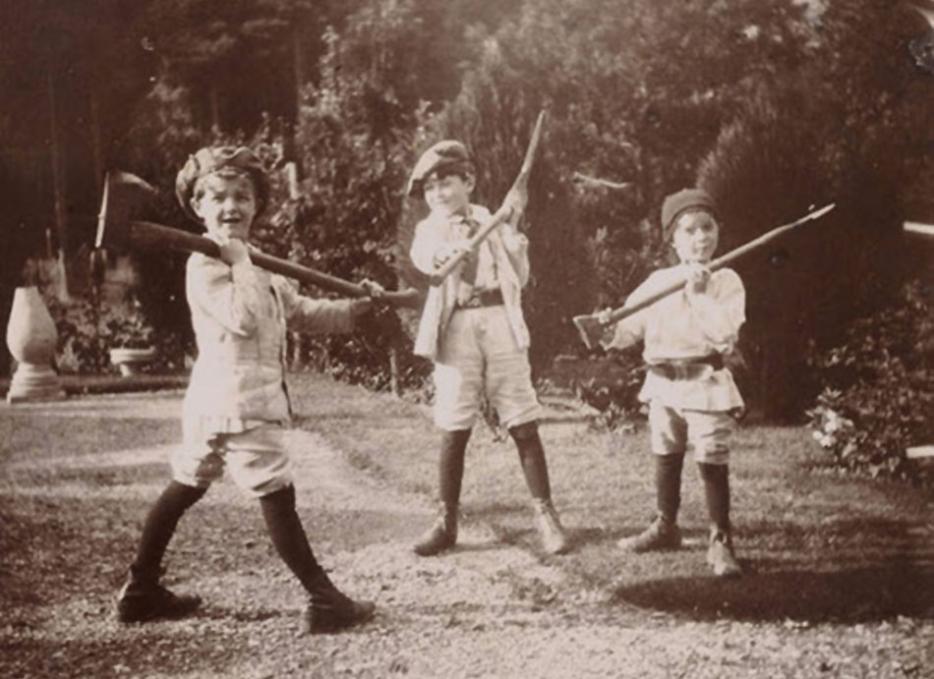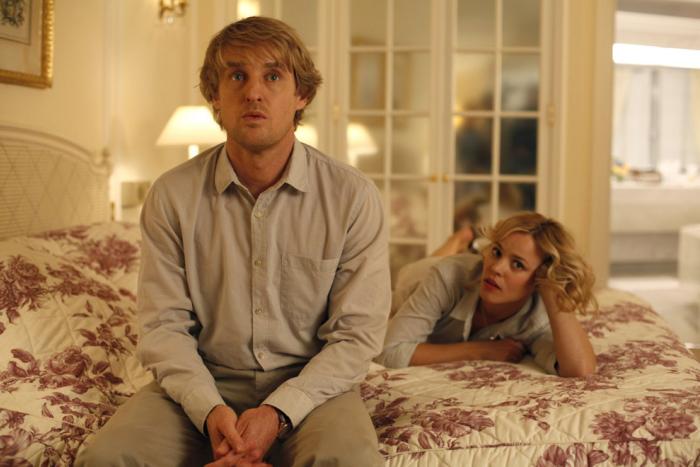In the summer of 1901, the four small Llewelyn Davies brothers—George, John, Peter and Michael—hadn’t any idea of what they were getting themselves into. Darting around Black Lake, in the Surrey region of England, they were playing at castaways, taking turns at walking the plank, substituting wooden dowels for swords. Their idyll was not just a theory. The country around them was still one in which children as young as nine worked in factories, but the Llewelyn boys were protected by their reverie.
The way they saw the world was a bit different than any of us did as children. They lived before Disney, before trick-or-treating, even before mandatory schooling. They had never even heard of Peter Pan. That would come later, from the brain of the strange, short Scotsman who played with them by that lake. He was known to them as Uncle Jim, and to us as J.M. Barrie. Barrie was then a playwright of middling reknown, a short man in a childless marriage, and still a man who had lost his brother many years before, and seen his mother become inconsolable.
It would take another year for these ingredients to amount to Peter Pan, or the Boy Who Wouldn’t Grow Up. Barrie first included him in a novel called The Little White Bird, which was an immediate hit when it appeared in 1902. The book made Barrie, according to his biographer Andrew Birkin, a magnet for ambitious mothers in the neighbourhood. They were sure he was a Man Who Loved Children, but instead he was just a man who loved the Llewelyn Davies boys, whom he thought were special, exceptional. And worth commemorating in a story that children, in future, would receive like gospel.
Falling into a good story can be like putting on a really great costume; the best ones make you forget who you were before you’d heard them, or looked in the mirror. This is the particular experience that attaches to the books we read in childhood; try to think back to your inner life before you knew of Anne Shirley, or Holden Caulfield, and you’ll see what I mean. And you’ve probably encountered the genesis story of Peter Pan before. Perhaps you saw the film Finding Neverland, and think of Barrie as a charismatic, Johnny Depp type. You may simply have a hazy sense that Barrie ran into a kid called Peter, and the rest was history.
And he did. Except, as it turned out, Peter was not the child he was looking for.
*
Here is what happened, much of which was uncovered by Birkin, after everyone in this story had died.
Sylvia Llewelyn Davies, who in an odd gesture to the gothic happened to be Daphne du Maurier’s aunt, did die, just as in the movie, of lung cancer. But she died in 1910, five years after the first staging of Peter Pan, not just as it came out. Already the play had integrated itself into upper-middle-class British society as a Christmas tradition. Actresses were already making careers off playing the titular role; a woman named Pauline Chase had played it every year since 1906. The play had been mounted on Broadway, too. And Barrie was readying the novel form of the story for publication.
By then Barrie had spent almost thirteen years with her boys, who by now numbered five. He’d been supporting the family for four of those years, since the death of the boys’ father, Arthur Llewelyn Davies. In 1909, Barrie had divorced his wife, who’d had an affair, possibly because he was impotent and certainly because he displayed little physical interest in her. No one knows whether or not he was in love with Sylvia, or what she thought of him at all. After her death he told people they’d been engaged, but he hadn’t anything to prove it.
Sylvia’s will named four guardians for her orphan boys; her mother and the boys’ two uncles joined Barrie on that list. Yet though her will said wonderful things about the kind of guidance she hoped Barrie would give her children, it left open the question of who exactly they would live with. Barrie swooped in to save the day by way of discovering a second handwritten will Sylvia had left, and he sent a copy to her mother. In it, Sylvia reinforced her desire that the children go with “Jimmy” and their nanny. It aligned with all the wonderful things her original will had said about him, and settled the question for everyone.
The gossip this arrangement fed, perhaps fattened by Barrie’s claims of the engagement, affected one of the children quite severely. Peter, by then thirteen, spent his first fall at Eton fighting off taunts about the connection between his name and new guardian. All the Llewelyn Davies boys were “lost boys” now, but only one of them shared a name with the famous figure. “If that perennially juvenile lead, if that boy so fatally committed to an arrestation of his development,” Peter would write in an account of his relationship with Barrie many years later, “had only been dubbed George, or Jack, or Michael, or Nicholas, what miseries would have been spared me.” He was an unwilling namesake, in a way, as he was not particularly close to Barrie, a situation likely only compounded by being sent away to school so quickly upon his mother’s demise.
Peter might always have had a touch of darkness in him. He’d title that document he left behind Morgue. And in 1960, after many years as a successful editor and publisher, he threw himself on a subway track. The line between that childhood unhappiness and that last day is at best a shaky one, if it exists at all. But it’s hard to evade the question entirely.
*
Michael was younger, only ten, when the boys were entrusted to Barrie. Along with his elder brother George, he was Barrie’s favourite. It was Michael’s illness (not Sylvia’s, as in the film) that had prompted Barrie to bring the play’s cast to perform at the family’s home back in 1906. And he was the one who seemed to take his mother’s death hardest, was prone to nightmares, and relied most heavily on Barrie for consolation. When he finally went away to school at thirteen, like his brother, he and Barrie wrote to each other nearly every single day, a habit that followed him to Oxford.
When World War I broke out, George was the only brother old enough to enlist. He joined his uncle, Guy du Maurier, at the front. When du Maurier was killed in March 1915, Barrie wrote to George, to comfort both his charge and himself. “He was a soldier by profession, and had reached a time of life when the best things have come to one if they are to come at all... and these are things to remember now,” Barrie cautioned, before adding, “I don’t have any iota of desire for you to get military glory... but I have the one passionate desire that we be together again once at least.”
A few days later, the doorbell rang in the very early morning. The youngest Llewelyn boy, Nicholas, was still living at home, and remembered waking up to Barrie’s wail. George had been the first of his company to die, shot through the head, during an attack in Flanders. He’d had the chance to reply to Barrie’s letter the day before. “I take every care of myself that can be decently taken. And if I am going to stop a bullet, why should it be with a vital place?” George wrote. “Keep your heart up, Uncle Jim, & remember how good an experience like this is for a chap who’s been very idle before.” He was twenty-one years old.
In Morgue, Peter called his brother’s death a “bad business,” and it was so not least for Barrie himself. “The effect on J.M.B. was dire indeed, poor little devil,” Peter remembered. His fame and money were no consolation when he lost “George, whom he had loved with such a deep, strange, increasing love, and who as he knew well would have been such a pillar for him to lean on in the difficult job of guiding the destinies of Sylvia and Arthur Llewelyn Davies’ boys—‘my boys.’”
Peter would follow George into the war, but live through it. He displeased his “uncle” by carrying on an affair with an older married woman. Michael, for his part, was due to enlist the day after Armistice, and so never went. Instead he ended up at Oxford, though he’d wanted to go to Paris and draw, become an artist. Barrie persuaded him to content himself with trips, but they whetted Michael’s appetite for more. He and Barrie, though they still wrote each other every day, quarreled a bit, over this and other things. Barrie disliked some of Michael’s Oxford friends. By 1921 Barrie was explaining in letters to others that, “Michael has the oddest way of alternating between ordinary reserve and surprising intimacy. No medium.”
A few months later, Barrie was walking out at midnight to post another letter to Michael when a man approached him. As Birkin relates it, the “man introduced himself as a reporter from a London newspaper, and wondered whether Sir James could oblige him with a few more facts about the drowning. Barrie looked blankly at him. What drowning?”
Bystanders had watched Michael and a friend, Rupert Buxton, drown in the Thames just that day. Michael didn’t know how to swim, though he’d long been intending to learn. At the inquest the witnesses reported that the water was still, and though accidental death was the official ruling, people would whisper of suicide. Even Peter would call it “perfectly possible.” The youngest of the brothers would speculate in old age that Michael was going through a “homosexual phase,” a theory many of Michael’s contemporaries shared.
Barrie walked home, called a few people, including the remaining brothers, and spent the rest of the night alone in his study. He could barely sleep; he thought of his own suicide. He never, by his own admission, quite recovered from Michael’s death. He left notes of his dreams of Michael:
… I dreamt that he came back to me, not knowing he was drowned and that I kept this knowledge from him, and we went on for another year in theold way til the fatal 19th approached again & he became very sad not knowing why, and I feared what was to happen but never let on—and as the day drew nearer he understood more & thought I didn’t—and gradually each knew the other knew but still we didn’t speak of it—and when the day came I had devised schemes to make it impossible for him to leave me yet doubted they could help—and he rose in the night and put on the old clothes and came to look at me as he thought asleep. I tried to prevent him going but he had to go and I knew it...
*
The story goes on, mostly because it has to; Barrie would live on for another sixteen years before he’d go on to his own next awfully big adventure. But many of those years were spent looking back, it seems. “I suppose I always knew that I made Peter by rubbing the five of you together,” he’d write in the dedication to the Llewelyn Davies boys that he added to a 1928 edition of Peter Pan, well after Michael died. “I clutch my brows in vain to remember whether it was a last desperate throw to retain the five of you for a little longer,” he mused, “or merely a cold decision to turn you into bread and butter.”
The more you know of the aftermath, the more you might incline towards cold bread-and-butter. But life is more complicated than that. Take one obvious question, or at least obvious to us in the post-Freudian age: was Barrie’s interest in the boys a prurient one? There are so many signals: his obsessions with the comings and goings of small boys, certain curious lines in his books, the celibate marriage, the tone of his letters to George, his fantasies of Michael. (Peter destroyed nearly Michael’s entire correspondence with Barrie, saying the letters were, “too much.”) But even Barrie’s greatest critics, the ones who see smallness in his preoccupation with childhood, covetousness in his co-optation of the Llewelyn Davises, agree he probably wasn’t. The boys, or at least the ones left to speak to it, denied it.
It might be less satisfactory to think of the story simply one of an affection that was as selfless as its holder knew how to make it, and of children who had to make do with it, and of a story that got so big, so fast, it swallowed the lot of them. Look at it like that and it almost looks inevitable.
There is one small tear left in that fabric: when Birkin looked up that second will of Sylvia’s, he discovered that Barrie had made a transcription error. Where Sylvia had written the name “Jenny”—the nanny’s sister’s name—he’d copied down “Jimmy.” Whether it happened by chance, or by design, we’ll probably never know.
One thing we can be certain of: Barrie knew what it cost to give in to temptation. In the novel, Peter Pan is given a chance to return to his mother. But upon arrival he’s seized with indecision. “Sometimes he looked longingly at his mother, and sometimes he looked longingly at the window,” the narrator tells us. “He had quite decided to be his mother’s boy, but hesitated about beginning tonight.” When Peter at last makes his final decision to return, he finds his mother asleep, clutching another boy. “There is no second chance,” the narrator laments to Peter, “not for most of us. When we reach the window it is Lock-Out time. The iron bars are up for life.”





